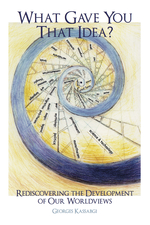About the Author: Georges Kassabgi
Georges Kassabgi graduated with a degree in electronics engineering. He has done research in computer technology for a multinational company, and holds five U.S. patents.
With a broadened scope within the industry, he became an advisor to businesses in many countries, and is the author of "The Legacy" (2001), a collection of discussion papers on management (the book is available online at www.ugik.com).
Over the years he has immersed himself in the history of philosophy and religions, which has led him to re-examine the origins and diversity of our worldviews. Recent writings include "What Gave You That Idea?" (2012) an essay intended as a first-step examination – toward a better understanding – of the origins and diversity of our worldviews, and "The Starting Note" (2012), a detective story in which philosophy plays a role in the police investigation.

We know a great deal about how the world around us has developed. But we differ widely on where and how it began, and speculate about its future. We thus maintain many worldviews: ways of interpreting our perceptions as well as identifying how best to interact with our environment in its diverse manifestations. Each worldview is right...up to a point.
Having adopted or inherited a worldview, we learn, discover, and improve with hope or capricious aims, but we also tend to reject different positions, even if they could prevent disruption or conflict among us. Is this aversion to change an inherent feature beyond our reach? Is it linked to our brain and mental capabilities? Is it the result of one or more chance events in our evolution by natural selection? Or does it arise from some distant ancestors’ guidance, which ended up becoming a hindrance to later generations?
The intent in this essay is to suggest new ideas as “inputs" to current work dedicated to our individual and societal well-being, or, more generally, aimed at a better coping with the universal unknowns. At the very least, some readers may eventually derive from this text a clearer sense of the obstacles toward the wonderful, ultimate goals inherent in their worldview. These idea-inputs have arisen out of the rediscovering of our collective, inherited beliefs—how they were initially proposed but then successively improved upon by numerous thinkers of the past and present, and what their long-term implications might be.
Each worldview has embedded in its origins, and as part of its unique development, a different version of our common story—starting points and other assumptions along the same timeline. This is at the heart of why proponents and opponents talk about the need to narrow the divide so as to prevent the clash of worldviews. Again, each is right...up to a point—whether or not we like it. More precisely, to talk about preventing conflicts without at least rediscovering—if appropriate, readjusting—the timeline and assumptions does not go far enough. A common point to all worldviews might allow a better outcome.
Please visit www.ugik.com for more information about the book.
 We know a great deal about how the world around us has developed. But we differ widely on where and how it began, and speculate about its future. We thus maintain many worldviews: ways of interpreting our perceptions as well as identifying how best to interact with our environment in its diverse manifestations. Each worldview is right...up to a point.
We know a great deal about how the world around us has developed. But we differ widely on where and how it began, and speculate about its future. We thus maintain many worldviews: ways of interpreting our perceptions as well as identifying how best to interact with our environment in its diverse manifestations. Each worldview is right...up to a point.